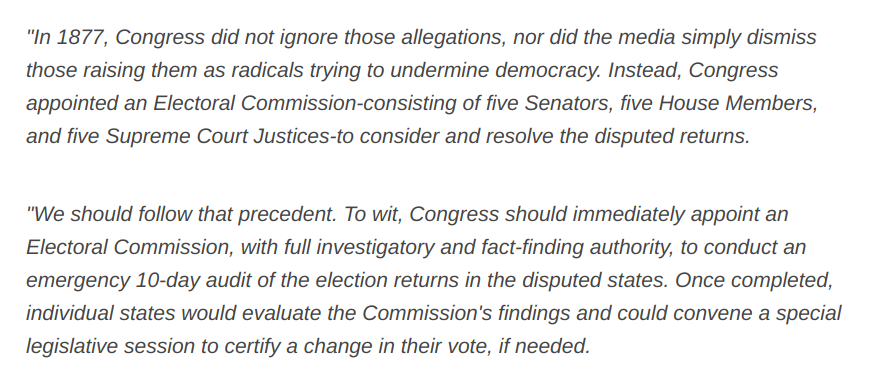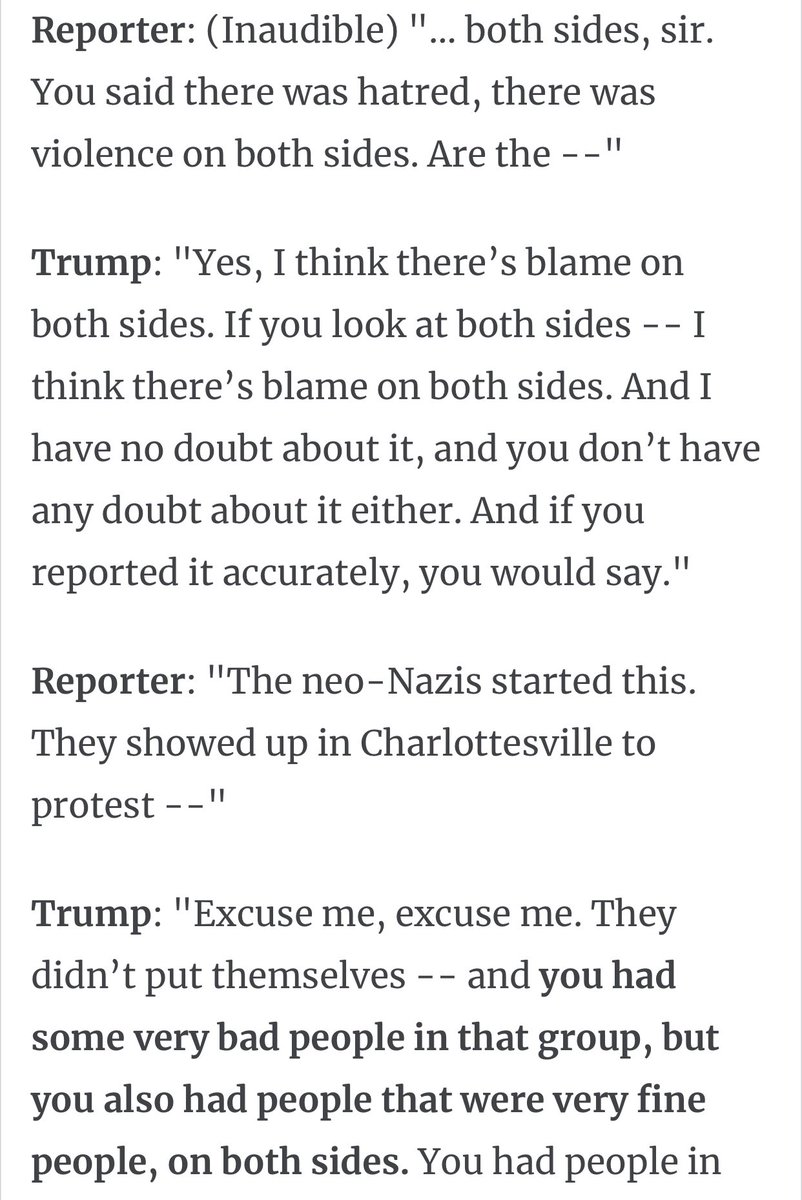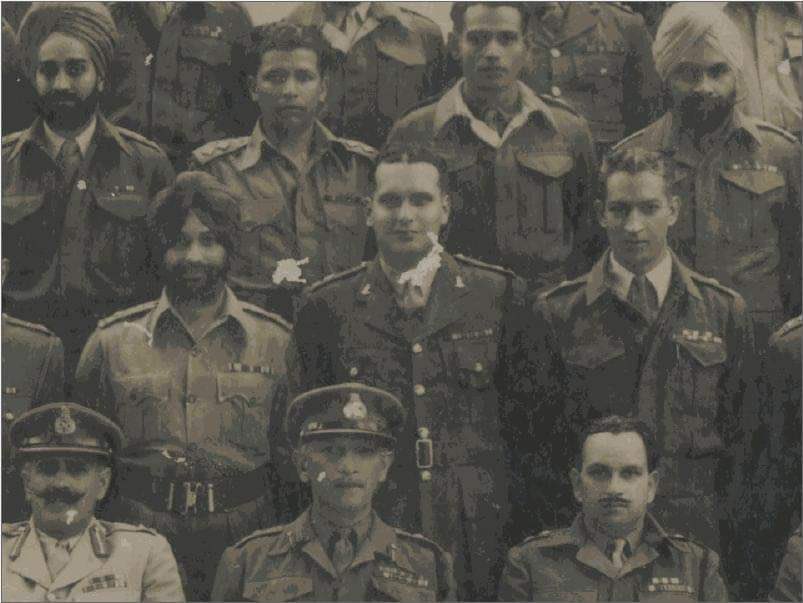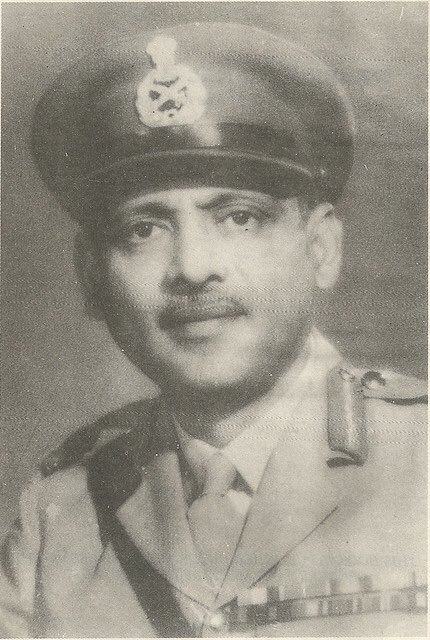The only thing they knew is that there had been a call to action--and to a large extent to arms as well--to disrupt the certification of Biden’s electoral college win. 2/63
According to Ali Alexander (formerly known as Ali Akbar) the idea was to show up so angry and in such overwhelming numbers that it would “change the hearts and the minds of Republicans who were in that body, hearing our loud roar from outside.” 3/63
(In fact, there is mounting evidence that Ali and other organizers of the event intended for the rioters to get INSIDE the fenced-in perimeter and even the building itself, which would in themselves have been unlawful actions--but that is a subject for another thread.) 4/63
Ali’s description might well fit the motives of many in the mob that assembled on January 6. But the more interesting and important question is: What did Trump and the activists and event organizers expect (or a least hope) that the *members of Congress* would do that day? 5/63
There was something that Congress could have done for them, consistent with the controlling law on the matter (the Electoral Count Act of 1887), which was to have the Senate refuse to certify the election of Joe Biden, 6/63
by challenging enough votes in the electoral college to deny Biden the 270 votes he needed to win the election. If that happened, the House would then decide the election by voting either Biden or Trump into office. 7/63
While this idea got some coverage in the media, it never got much support in Congress, even among Republicans who supported Trump.
For one thing, it clearly didn’t have the votes to succeed, in either the Senate or (subsequently if it came to that) in the House. 8/63
Furthermore, as McConnell said in his speech before the Senate, if successful, the move would set a terrible precedent for the GOP. As McConnell pointed out in that speech, in the future any party with a majority in the Senate and House 9/63
(think Democrats here, as McConnell surely was) could use Congress to usurp state authority and nullify the leverage small states have in the Electoral College, where the electors from Wyoming (pop. 579K) carry the same weight as those from California (pop. 40 million). 10/63
Establishment Republicans were also appalled at the idea of giving Congress, a national body, the power to decide the presidential election: perhaps the ultimate violation of the principles of federalism. 11/63
There was another, insanely criminal plan to keep Trump in office that was afoot that day on the part of at least some of the rioters: kidnap or assassinate Pence, who was authorized by the Electoral Count Act to count the ballots and announce the winner of the election. 12/63
It is an important question whether and to what extent Trump, Giuliani, WH aides, and some members of Congress with white nationalist affiliations and sympathies knew of this plan and either facilitated it or failed to blow the whistle on it. 13/63
There was another proposal in play that day that we know was supported by some congressional Republicans. What it proposed for the Senate do would have been unlawful, since the congressional action it proposed 14/63
lay well outside the controlling Electoral Count Act of 1887.
Beyond that, however, it was not (at least on its face) criminal or seditious. 15/63
Here’s the crucial part of the statement (the excerpt omits the high-sounding rhetoric that was used to justify the proposal): 16/63
https://t.co/c7XLpLlxcD
Let us note, first of all, that the reference to Congress’s action in 1877 is not apposite. (Are you surprised? Republicans are masters of the false equivalence.) 17/63
In the election of 1876, some states had returned more than one slate of electors, and this had forced Congress itself to act and decide the election, but there was nothing comparable before Congress on January 6. 18/63
In 2020, every state had sent only one set of electors, and none of the challenges by Republicans to the elections that were under dispute (because they tipped the election to Biden) had been upheld by the courts. 19/63
In short, there was no question that Biden was the duly and legitimately President-elect of the United States, as every sane observer (including all reputable legal scholars) said, repeatedly. 20/63
Even the eleven Senators admitted there was virtually no chance that they would have the votes to hand the election to Trump on January 6. 21/63
Nevertheless, Cruz and the others claimed that they were trying to defuse a “volatile” situation by proposing that Congress should pass a 10-day extension. Cruz said: 22/63
https://t.co/igmmtwn4xo
But the critics were absolutely right: Cruz’s proposal *was* highly dangerous and in fact treasonous. Why? Because, had it been adopted, the proposal would have led inexorably, and quite quickly, to a constitutional crisis. 23/63
One of the problems was a matter of timing. Cruz and the others must have been aware of this: that is probably why they proposed that the Senate reject the contested EC ballot *before* voting the “fact-finding” commission into existence. 24/63
As a tactical matter, this made perfectly good sense, because proposing that the Senate vote on the fact-finding matter *before* rejecting the election results that Trump had challenged would have exposed the proposal for the dangerous ruse that it was. 25/63
The problem is that there is no way that such a fact-finding mission could be established and have completed the given task within ten days. 26/63
Our whole national experience with such commissions (think of the commission investigating the Kennedy assassination and the 9/11 commission) shows that voting on the membership of such commissions is itself highly controversial and time-consuming. 27/63
The commission would also have faced legal challenges, delaying matters even further.
For example, Giuliani and Sidney Powell, the duo that apparently came up with the idea of the extension, suggested that the Dominion voting machines should be seized. 28/63
But would the Commission have had the legal right to seize those machines in the event that they weren’t turned over voluntarily by the respective states? 29/63
A moment’s reflection shows that it was absurd for Cruz and his colleagues to suggest, as the their statement implied, that there would be time enough in ten days (1) for the Commission to be established; (2) for the Commission to complete its audit; 30/63
and (3) for the individual states to “evaluate the Commission’s findings and convene a special legislative session to certify a change in their vote, if needed.” (!!). (Step 3 alone would have taken a *lot* of time, even assuming it could be completed at all.) 31/63
Bottom line: what Cruz and the other eleven Senators contemplated couldn’t possibly have been completed in 10 days (not even the beginning of it could have been). It would have taken way more than FOURTEEN days to be completed, 32/63
and that would have been the mischief. It meant that the delay would have created a constitutional crisis, because noon on January 20 is specified in the 20th Amendment to the Constitution itself as the time for the Inauguration, 33/63
and *there is no provision in the Constitution for what happens if that deadline is not met.* 34/63
Thus, the proposal would inevitably have created what a Marxist would call “revolutionary conditions,”
because it would inevitably have left Trump in the White House, with no constitutional means of resolving the matter. (See my earlier posting): 35/63
https://t.co/ux9DAnvr9r
Predictably, though, Trump’s “freedom patriots” and especially the armed right-wing militias of that movement would have tried to settle the matter in the streets. We know that because we know a lot about what the rioters were thinking that day. 36/63
No one rioting at the Capitol on January 6 could have reasonably believed that what happened there that day could, in itself, have settled the election in their favor--and probably no one that day did, if they thought about the matter at all. 37/63
They clearly believed that it was absolutely necessary to Stop the Steal in Congress by disrupting or blocking Congress’s certification of the election, 38/63
but that was only the necessary part. What was the sufficient part? They probably didn’t know, but they must have suspected that they would be called upon as “freedom patriots” to do a lot more even after January 6, no matter what the outcome was that day. 39/63
That is why it is a mistake to call January 6 an attempted coup. That it certainly was, but it was actually much more than that: it was an incitement to insurrection and revolution. 40/63
A coup is a short-term event, usually lasting a day or two at most. If it fails, that is the end of it, and if it is immediately successful, that is also the end of it *as a coup.* 41/63
But there is no way that the Stop the Steal event on January 6 could have been the end of the matter. To the extent that it did prove to be successful, it would have led inevitably to a revolutionary situation. 42/63
We know also from the text messages law enforcement has collected that the most militant of the rioters came fully expecting a revolution. 43/63
As one militant rioter exulted that day: “This is just the beginning.” The armed militants were excited, even overjoyed, that the racial and cultural civil war that they had been dreaming about for years was finally starting to unfold. 44/63
We already know that the FBI and Congress are investigating whether some representatives (Biggs, Gosar, and Brooks are typically mentioned in this connection) were complicit in this insurrection. 45/63
But they also need to look at the Senate, and in particular at Senator Ted Cruz (R-TX).
There are a number of things that need to be investigated here. 46/63
For one: what must Cruz have been thinking (not just saying) when he proposed his constitutional time bomb?
What made him think that it was feasible to have such a commission established and for it to complete its work in TEN DAYS? 47/63
Also: what was the extent and nature of Cruz’s communications with the organizers of the event, and especially with Trump and Giuliani? 48/63
We already know that Trump had asked Cruz to represent him in an election challenge case before SCOTUS.
When that challenge failed, what did Cruz know about Trump and Giuliani’s plans or expectations for the January 6 event? 49/63
Did he know, or wasn’t he at least in a position to reasonably infer, that significant elements at the rally were militants who came prepared for revolution and wanted it?
It’s hard to believe that he didn’t. 50/63
(That is true, by the way, of all the Republicans in the House and Senate. After all, the rioters who showed up on 1/6 at the Capitol were *their* voters and constituents. They certainly weren’t Democratic Party voters and constituents.) 51/63
No doubt it was in large part because of what he did know that Cruz spoke on January 2 about a “volatile situation” and a “tinderbox.” 52/63
Luke Mogelson has reported in the New Yorker that the rioters who reached the Senate chambers concluded that Cruz was “on their side” simply because he was going to vote to throw out votes from some of the states that had voted for Joe Biden, just as Trump wanted. 53/63
Inside the Senate chamber, Mogelson said: 54/63
https://t.co/j8AQkY3Vhy
But the whole picture is even worse than the one Mobelson describes, because we must take into account Cruz’s statement, which was issued on January 2, four days before the armed attack on the Capitol. 55/63
Could anything have given more encouragement and a greater lift to the aspirations and hopes of the seditious plotters than this statement? After all, buying time and keeping Trump in office until (and beyond) January 20 was what they needed to keep Trump in power. 56/63
How could Cruz have been unaware of this? He obviously thinks he’s smart, and desperately wants everyone else to believe he is smart. 57/63
As one former Trump aide and critic said of him: “He’s supposed to be a smart asshole” (but also that “He’s supposed to at least be a smart, savvy asshole”). 58/63
https://t.co/6HfMicvebs
We need to find out what Giuliani and Trump knew, believed, and intended regarding the Save America event, and specifically the extent to which they might have been willing to lend assistance to, or at least turn a blind eye to, 59/63
an armed insurrection against the United States government, which was itself part of a larger project to overturn an election and destroy American democracy. 60/63
If there was such an insurrectionary plot on the part of at least some of the activists and event organizers, did Cruz and the others simply play into their hands unwittingly? Or did Cruz and others know enough about a conspiracy to make them complicit themselves? 61/63
Cruz’s proposal would surely have sown a whirlwind. Did Cruz think that he could use that whirlwind (a constitutional crisis and the ensuing turmoil) to his advantage in GOP politics? 62/63
If you agree that the FBI and Congress should get answers to these questions (and maybe more I haven’t thought of), please RT this thread to
@SenTedCruz, @FBI, @SenatorSchumer, and
@tribelaw. Thank you. 63/63
PS/ I see that Tommy Tuberville, freshman senator from Alabama, said on Wednesday morning (shortly before the voting and rioting) that he wanted Biden’s inauguration to be postponed until after January 20 due to the pandemic!
https://t.co/VZD43e0pnO
Tuberville was one of the signatories to Cruz’s statement, which advocated a 10 day extension. So: Tuberville was clearly looking for other justifications for leaving Trump ensconced in the WH. That seems to have been the main thing. What about Cruz?





















